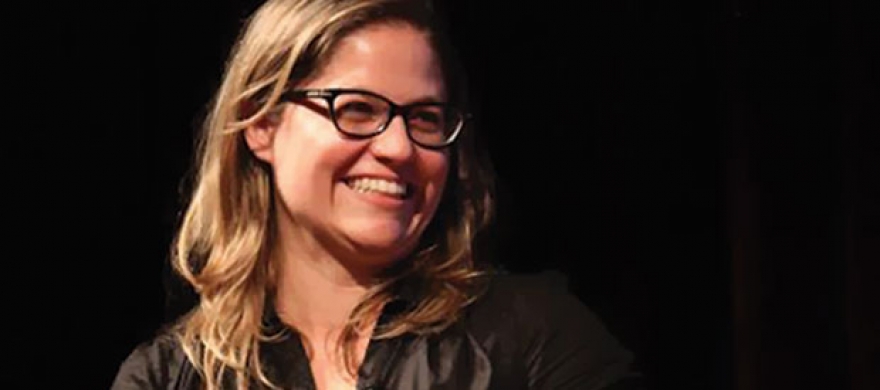Old Data, New Tricks
At a federal digital consultancy in Washington, DC, School of Public Policy alumna Lindsay Young (MPP ’10) develops data technology inside the government for the government
In the late 1990s an Associated Press reporter by the name of Martha Mendoza was investigating the use of federal lands for a Los Angeles Times piece. What she found over the course of her lengthy research period, buried in reams of data, was that the federal program charged to save the lives of wild horses was actually using its multimillion-dollar grant to instead ship them to slaughterhouses to be used for meat. It took Mendoza months of research poring over endless numbers and land documents to determine the sinister intentions of the program.
As an innovation specialist at 18F in Washington, DC, School of Public Policy alumna
Lindsay Young is in the business of empowering journalists—and scholars, developers,
and other data seekers—by developing the technology that advances the efficiency of
data organization. In the last two years Young has helped the Federal Election Commission
release a new API—application programming interface—and launch a public beta website
designed to improve access to political fundraising and campaign spending data.
“You don’t know what people are going to find useful and how they’re going to use
it,” explains Young, who also educates students in the government analytics master’s
program as adjunct faculty at Johns Hopkins University. “A data set might not be interesting
to you, but people can leverage that data to run a business, or be more efficient,
or lead to an exposé. Finding that data can lead to a lot of unexpected benefits.”
While the FEC boasts a sterling reputation for housing bulk data, its existing web
interface was difficult to use and not intuitive. “The information was always there,
but it was so hard to find that people were having trouble using the resource.”
Young and her team launched the FEC beta site (beta.fec.org) in 2015, which will unveil
formally this spring. According to the 18F blog, the new website allows users to “browse
comprehensive lists of candidates, committees, filings, receipts, and disbursements.”
A new glossary tool helps define campaign finance jargon. The FEC website also enables
users to utilize the bulk data as well as the open source (public) APIs to not only
collect data but also write their own programs. The open data advocate splits her
time between advising strategy and actually implementing the technology that improves
transparency and usability.
At the Sunlight Foundation, Young became immersed in investigative data journalism
and was specifically drawn to the numbers behind the stories. In her role as a software
developer, reporter, and researcher, she used campaign finance and lobbying records
to produce meaningful public interest journalism. After five years, she became intensely
aware of the data presentation she preferred—and the type she thought was most efficient—and
set out to develop it herself. While she had no intention of switching careers, she
had begun taking free courses in programming language taught by a friend and realized
the benefit of the complicated logic that actually simplified routine tasks and added
value to the ways people used open source data.
The first script she wrote wasn’t very long, but it helped to introduce important
win/loss percentages for political action committees that were used on TV and in print
media by journalists who knew what they were looking for but needed help finding the
data. The website became the Sunlight Foundation’s top hit.
“Once we created these kinds of data explorers, the end result wasn’t for journalists,
but journalists sharing it with an audience,” says Young.
Young was initially drawn to the School of Public Policy because of her interest in
civics, but cultivated a passion for civic technology while there. Though she had
originally considered pursuing a law degree, Young realized she did not want to practice
or study law, but wanted the types of jobs that she could get with a law degree. The
self-proclaimed “political data geek” realized public policy emphasized the concepts
that were more in line with her interests, especially the ones that she discovered
while working as a marketing analyst at Morgan Training Company using technology to
analyze customer satisfaction data.
“We were required to work with stakeholders with their own interests and ideas and
try to balance different interests in a collaborative way,” says Young. “I think that,
on a different scale, requires strategic thinking.”
With a new FEC website on the horizon, Young and her team of 10 continue to work with
reporters, those who file with the FEC, and even members of the public who want to
know about money in politics on how they would prefer to navigate the resource. Young
contends that openness leads to better habits.
“All the code I’ve ever written has been published online. When you publish a code
and make it shareable, you don’t cut corners because you know people can see it, and
if you know no one’s going to ever look at it, you don’t put in extra effort. The
same goes for most things.”
“I’ve been on both the inside and outside the government, and it’s definitely something I want to continue to pursue so that people have the
technologies and data to support democracy,” she continues. “Transparency helps people
make informed and responsible decisions, and the government has an obligation to be
transparent because it ultimately needs to answer to the people. If people don’t know
what’s going on, the government will not be as effective. I want people to have the
data to make the best decisions for themselves.”
